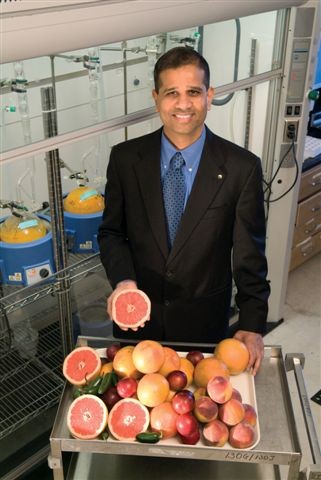Patil selected for Love, Tito’s endowed professorship
Endowment to support responsive agriculture teaching, research, service, more
Bhimanagouda Patil, Ph.D., Texas A&M AgriLife Research Regents Professor, has been selected for the Love, Tito’s Endowed Professorship in Responsive Agriculture.

Patil is affiliated with the Department of Horticultural Sciences and Department of Food Science and Technology in Texas A&M’s College of Agriculture and Life Sciences. He is also director of Texas A&M’s Vegetable and Fruit Improvement Center.
The endowed professorship was made possible by Love, Tito’s, the philanthropic arm of Tito’s Handmade Vodka, based in Austin. Its purpose is to support responsive agriculture teaching, research, service and professional development in the College.
Professorship to impact sustainable food agriculture, nutrition
Patil said he is “deeply humbled and honored to embark on this extraordinary journey” as the Love, Tito’s endowed professor at the College in support of the Institute for Advancing Health Through Agriculture.
“I am grateful to Love, Tito’s for their generous sponsorship of this endowment and their shared devotion to serving the global community via transformative research and development initiatives at the Institute,” he said. “Their support could not have come at a more important time.”
Patil said the endowed professorship will allow him to integrate “his unwavering passion for foods, health and sustainable agriculture” to address food and nutritional security through cutting-edge technologies.
“Leading the Vegetable and Fruit Improvement Center fills me with tremendous excitement, alongside the incredible support and dedication of our transdisciplinary scientists and students, who share in our endowment’s ambitious goals,” he said. “For years, the center has remained steadfast in its dedication to exploring the vital connections between responsive agriculture, quality food production, and human nutrition and health.”
Patil said the endowment will provide the College with the additional resources needed to profoundly impact the global agricultural community.
About Patil
Patil is a Regents Professor at Texas A&M University as well as a Texas A&M AgriLife Inaugural University Professor and Senior Research Faculty Fellow. His area of academic expertise is in the link between food and human health. His teaching has focused on that linkage, leading him to develop three unique and multidisciplinary courses. The courses relate the science of foods for health, the nexus of food and nutritional security, hunger and sustainability, and phytochemicals in fruits and vegetables to improve human health.

Patil’s research also focuses on foods for health, including a systems-wide approach to address farm-to-table production that examines pre- and post-harvest effects on bioactive compounds and their role in human health.
His work has revolutionized the study of citrus bioactive molecules, moving beyond the traditional focus on vitamin C to examine the complex array of eco-friendly bioactive molecules found in citrus fruit. His work on limonoids, flavonoids, and furocoumarins has resulted in the development of “green” technologies that have led to the isolation of important novel compounds with the potential to revolutionize microbiota research.
Patil’s other pioneering work includes using mechanistic studies to demonstrate the potential health benefits of consuming certain foods, including research on limonoids and their possible multifunctional structural properties.
He has been published in the top journals of his field, including 241 peer reviewed publications in agricultural and medical journals. His publications have over 14,438 citations, and he has edited 11 books/symposium series, 33 editor-reviewed proceedings, and 27 book chapters.
Patil’s contributions have been recognized through numerous internationally and nationally recognized awards from professional societies and agencies. Notably, he has received the Outstanding Research Award from the American Society for Horticultural Science. He also received the 2022 Distinguished Achievement Research Award from the Association of Former Students, Texas A&M University.
Some of his additional honors include a ‘Healthy Living Lifetime Achievement award’ by the Texas International Producers Association, a Distinguished Service Award from the Division of Agriculture and Food Chemistry of the American Chemical Society, an Outstanding Graduate Educator Award from the ASHS, and a Deans’ outstanding achievement award from the College of Agriculture and Life Sciences.
Patil has been recognized as a Fellow by the American Chemical Society, ACS, the American Society for Horticultural Sciences, the Brazilian Horticulture Society, the Indian Horticulture Society and the Division of Agriculture and Food Chemistry of the ACS.
About responsive agriculture
Responsive agriculture, a focal area of the Institute for Advancing Health Through Agriculture, is a science-based, dynamic systems approach to agriculture that seeks to respond to the growing public health challenge of escalating chronic disease while considering environmental sustainability and economic viability.
The endowment will support responsive agriculture through:
- Human Nutrition and Public Health: Determine how production agriculture can support human health by increasing the health-promoting qualities of food and agricultural products.
- Environment: Develop approaches to identify how agriculture can support environmental quality and make agriculture more resilient to environmental changes. This will include efforts to increase and sustain carbon sequestration, reduce greenhouse gas production, increase water-use efficiency and diminish negative impacts on water quality, as well enhance options for renewable energy.
- Economic Health: By incorporating an improved understanding of consumers and society, this research emphasis will identify how consumer behavior science and behavior economics affect food systems. It will also investigate how to fast-track adoption of new systems by producers, processors or consumers by identifying consumer needs and preferences.
“Through the collaborative efforts of the Institute of Advancing Health Through Agriculture, the Vegetable and Fruit Improvement Center, the Department of Horticultural Sciences and AgriLife Research, we will forge a future for agriculture that embraces resilience, equity and prosperity, helping shape the lives of future generations,” Patil said.





